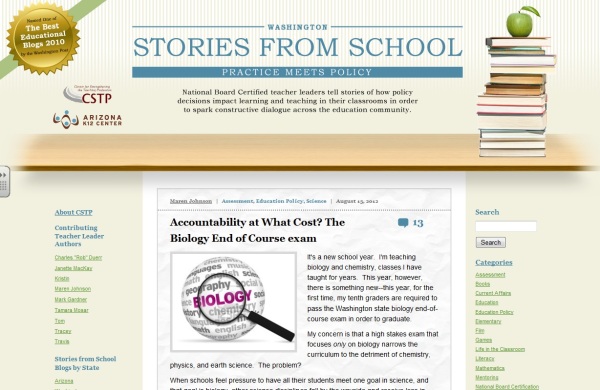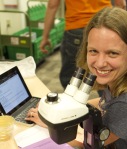 It was beef day in Olympia and the cowboy lobbyists brought their barbecue and shared all around. It was hard to compete with that, but my fellow educators and I did our best to make the case for the Next Generation Science Standards, and I also talked about the Biology End of Course Exam. We testified before the House Education Committee. It was actually pretty fun.
It was beef day in Olympia and the cowboy lobbyists brought their barbecue and shared all around. It was hard to compete with that, but my fellow educators and I did our best to make the case for the Next Generation Science Standards, and I also talked about the Biology End of Course Exam. We testified before the House Education Committee. It was actually pretty fun.
The legislators were interested! Representative Steve Bergquist asked me, “Is the current Biology End of Course exam graduation requirement standing in the way of a transition to the Next Generation Science Standards?” (1 minute, starting at 32:48)
http://www.tvw.org/index.php?option=com_tvwplayer&eventID=2013041051#start=3248&stop=3317
Testimony: Madame Chair, members of the committee: My name is Maren Johnson. I’m a National Board Certified science teacher at Chimacum High School. Chimacum is a small rural school district located on the Olympic Peninsula. I teach tenth grade biology and chemistry. Next year I’m teaching a dual credit College in the High School biology class.
I’ve been part of the OSPI team that has been reviewing drafts of the Next Generation Science Standards. It’s been gratifying to see evidence of our feedback used in the draft revisions.
The Next Generation Science Standards show what science education can be. Science and engineering practices are paired with content to provide a context for the student learning. I’d like to describe this to you by telling you about one of the projects my students have worked on in the last few years. I attended a summer science partnership program for teachers–I had the opportunity to shadow a research scientist in Seattle for a week. The topic of this scientist’s research? That’s right…Monkey Herpes.
I learned how to use biotechnology to analyze proteins produced by monkey herpes with gel electrophoresis. I then collaborated with the scientist and with other teachers to develop a curriculum project. Back in the classroom, my students analyzed proteins using the same research lab techniques used to study monkey herpes–but instead, my students studied proteins from our local salmon. This electrophoresis lab with local salmon was a blast!
I’d like to think this protein electrophoresis project embodies what the Next Generation Science Standards are all about–students learning science the way science is practiced in the real world—integrated, rigorous, and applied.
The Next Generation Science Standards also promote coherence in teaching science across disciplines and across grades. This is different than what sometimes happens with our current standards and state assessment.
Currently, my tenth grade students take a year of biology followed by the biology end-of-course exam. It’s a pretty narrow focus which emphasizes biology. I’m excited about the potential of the Next Generation Science Standards to break the bounds of my existing biology class. Engineering is going to be integrated into biology in a way it never has been before.
This year’s sophomores, the students I currently have in class, are the first students to be required to pass the biology EOC in order to graduate–they will be taking this test in June. I find myself in the very odd position right now of talking about the adoption of the Next Generation Science Standards when at the very same time, this year, my students are facing a brand new biology EOC requirement based on the old state standards! Right now, considerable time and attention is being paid towards preparing students for this new biology EOC grad requirement. This shifting of school resources towards a high stakes biology EOC, focused on a single discipline in science, goes in the opposite direction of a transition to the broad based Next Generation Science Standards.
Where these new standards are going to meet with success or failure is in the classroom. To make these standards successful, we don’t just need teachers to adopt the standards–what we need is for teachers to hijack them. I mean that in the most positive way–teachers need to grab those standards, make them our own, and use them to improve student learning and our science education system.
However, it’s not going to be a true hijacking, because we as teachers cannot fly this next generation spaceship alone–we are going to need professional development, time, and support–from our districts, from OSPI, and from you, our legislators.
Testimony (4 minutes, starting at 25:43):
http://www.tvw.org/index.php?option=com_tvwplayer&eventID=2013041051#start=2543&stop=2782
Representative Monica Stonier also wanted to know about transitioning standards and high stakes testing. (30 seconds, starting at 32:15)
http://www.tvw.org/index.php?option=com_tvwplayer&eventID=2013041051#start=3215&stop=3248
—————————
Interested in what a regional science coordinator, an instructional coach, or some of the folks at OSPI had to say about these standards? Listen to the rest of the House Education Committee meeting.















